How teenagers coped with a 48-hour digital detox
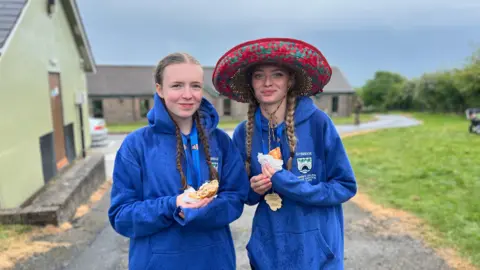 BBC
BBCYoung people who took part in the Ten Tors Challenge across Dartmoor in Devon said it was amazing to "detach" from technology as they gave up their mobile phones for 48 hours.
Team members on the trek were forced into a "digital detox" as they had nothing but the essentials and, as part of the event rules, had to surrender phones before setting out.
Participant Milly, who attends Ivybridge Community College, said: "I think this generation finds it so hard to be away from their phones."
She said she missed listening to music more than anything because it was "motivating". However, the team improvised and sang together instead, she added.
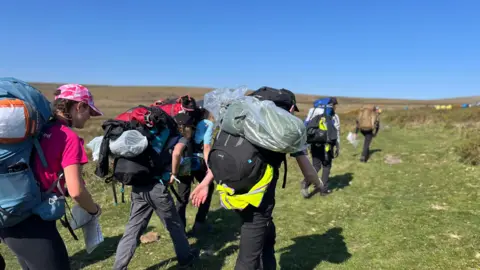
Milly said: "I would have listened to some pop music, something like that."
The team leader for Dartmoor Plodders said it was "very rare" for young people to have time without their phones these days.
Huccaby Brown said the 2,400 teenagers who took part in the annual event, aged between 14 and 19 years old, had a weekend in the wilderness where there was much more to look at, think about and do rather than looking at a screen.
"It gives you a view that there is something else in the world other than the screen in front of you," he said.
Mr Brown said he did receive some complaints from his team about not keeping their "streaks" - messaging or interacting with friends every day - which he did not understand.
Asked whether he could be separated from his phone for a weekend, he said: "It was a bit different then and whether I could nowadays, I don't know.
"My excuse is that I need it for work, but I probably could."

One Dartmoor Plodder, Charlotte, who completed the 35-mile (56km) route, said the thought of her phone being in a plastic bag at the starting line, not on her person, was "horrendous", but it did allow her team to build stronger friendships.
Fellow team members and sisters Scarlet and Eleanor said they kept reaching to their pockets for their phone during the trek.
Scarlet said: "Sometimes I would reach in my pocket to get it and it wasn't there, which was sad."
Eleanor said she was distracted by the moor and walking around, so she forgot she did not have her phone, other than when she wanted to message people.
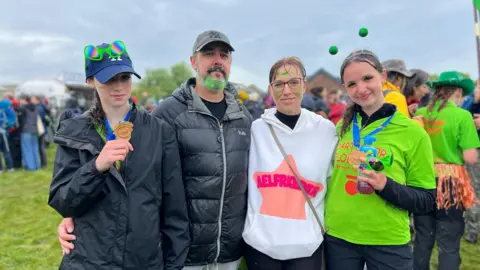
Parents Lyn and Mark Winsper said daughters Scarlet and Eleanor were usually "glued" to their phones at home, adding it was good for them to have a little bit of time without it.
Mr Winsper said: "We always encourage to get out and about, phones are not integral to them, but two days without them is good."
Mrs Winsper also said whenever they did go out as a family walks or horse-riding, away from their phones, photos did end up on social media shortly after, so it was "all linked".
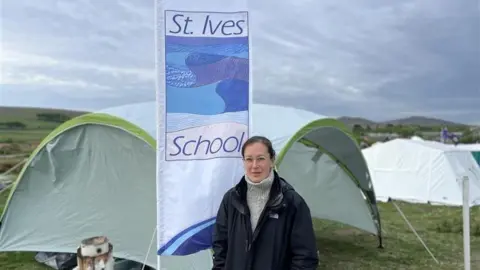
St Ives Secondary School teacher Laura McCall said teenagers not having their phones was a "big deal" and it was not something to be "underestimated".
"They are very much used to having contact, like a lot of us are with the outside world and the internet," she said.
She also said students had noticed the positives about having a break from their mobile phones and were proud of their achievements.
"It is nice for them to have that understanding that, as much as they feel it is a necessity to them, they can actually achieve a lot without the aid of that.
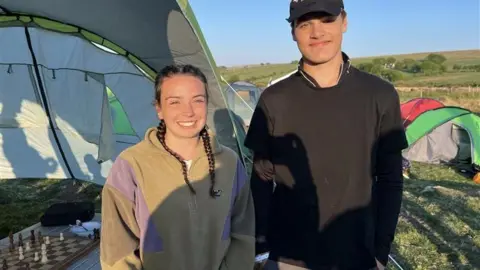
"In class, you do get the odd student using their phone to check the time. They use their phone for so much more than just contacting people."
On Friday evening, ahead of the two-day challenge, she said the event allowed the team to socialise with other schools and people from different backgrounds they might not have been aware of.
Mrs McCall said: "They were here playing chess with the different schools, and we had a few girls from other schools and they were braiding each other's hair for the next morning.
"It was so lovely to see the interaction between them all and, for them, to have the freedom to have fun."
Members of the St Ives team, who completed the 35-mile challenge, said they were looking forward to a good night's rest and seeing their families over getting their phones back.
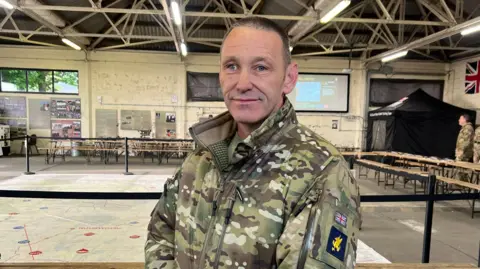
Sgt Tosh Hodgkins, from the Army's HQ South West cadet training team, said the challenge enabled the participants to be away from distractions and do nothing but talk to each other for 48 hours.
He said: "They make their decisions without referring to anything electronic and it just opens up their worlds to what they can achieve without having to rely on technology and Google.
"It strips everything away and puts them back to the people they are and they rebuild themselves."
Follow BBC Cornwall on X, Facebook and Instagram. Follow BBC Devon on X, Facebook and Instagram. Send your story ideas to [email protected].
